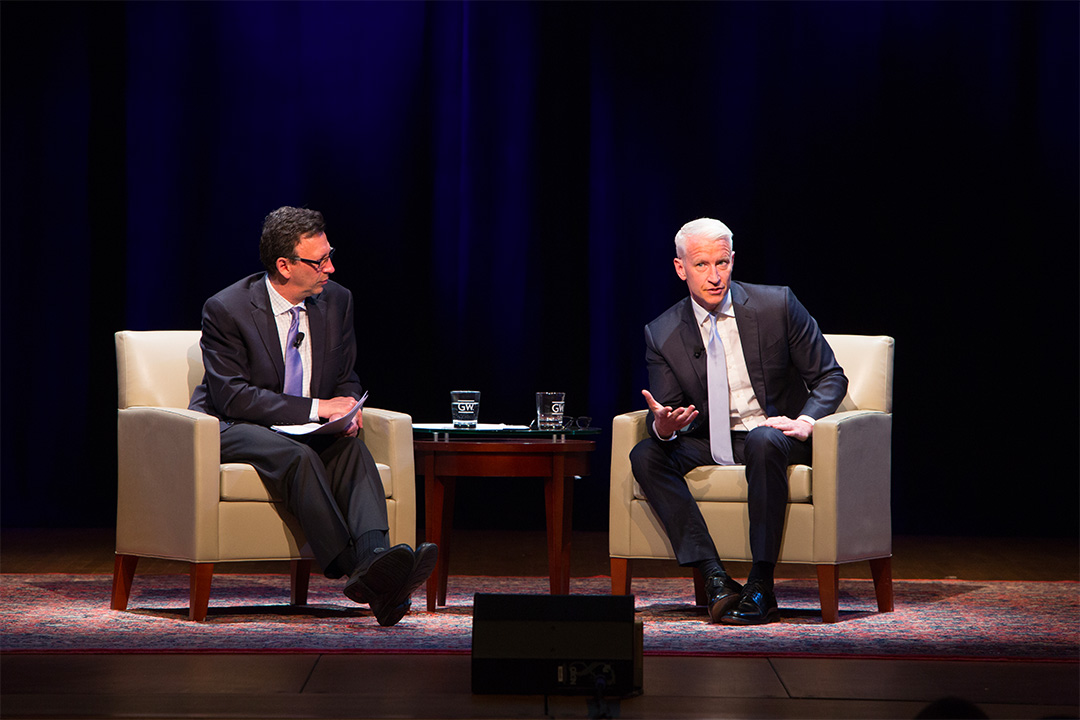By Miriam Smallman, JMC '16
It is a testament to the vast number of political wonks and journalism junkies at GW that Anderson Cooper is met by raucous applause when he walks onstage at Lisner. It was as if we were greeting a rock star. But Anderson Cooper is a rock star for many and not just those who regularly watch him on CNN or CBS. He is also openly and proudly gay, something he called “one of the great blessings” of his life.
It was fitting, then, that the School of Media and Public Affairs (SMPA) teamed up with Allied in Pride, GW’s LGBTQ advocacy organization, to bring Cooper to campus on February 29th for an SMPA Conversation Series event. The conversation, moderated by SMPA director Frank Sesno, pivoted immediately to Donald Trump . . . and to his wife—Cooper had to move Monday’s talk to the afternoon in order to interview Melania in New York that morning. Cooper discussed whether Donald Trump would be the inevitable Republican presidential candidate (Cooper said it was ‘very hard’ to see a path for other candidates), and noted that Trump had the advantage of notoriety going into the race. In terms of whether the media’s coverage of Trump has been disproportionate, Cooper noted that Trump has made himself available to the media, far more than the other candidates.
Cooper also talked about interviewing Trump, and called him “a compelling character, whether you like him or hate him.” He said his job was to try to get Trump’s perspective, but also present Trump with facts and challenge him.
Cooper’s interview style can be confrontational, Sesno noted. The audience saw a clip of Cooper interviewing former Louisiana senator Mary Landrieu after Hurricane Katrina. Landrieu began by thanking politicians for their words of support, but Cooper cut in, “For the last four days, I’ve been seeing dead bodies here in the streets of Mississippi. And to listen to politicians thanking each other and complementing each other . . . I’ve got to tell you there are a lot of people here who are very upset and very angry and very frustrated.”
Cooper said Landrieu’s reaction “seemed wildly inappropriate based on what we were seeing,” and that he was privileged to be able to speak to people in places of power. Sesno asked Cooper, who has traveled around the world covering international conflicts, what motivates him to cover war, famine and disaster.
“People don’t talk about loss,” Cooper said. Cooper, whose older brother committed suicide in 1988, said he felt a desire to be around others who were experiencing loss and to be “in a world where there isn’t any ‘why.’”
At the end of the talk, Cooper took questions from the audience. One student asked Cooper his advice for aspiring journalists. “Figure out your voice,” he said. “Learn how to write in your voice.” He also emphasized the value of hard work and “outhustling everyone.”
Another student asked Cooper what made him nervous.
“I don’t like being nervous about anything,” Cooper said. This included moderating debates, during which he’s not nervous but rather, has a “heightened sense of awareness.”
As for the debates themselves? “They’re like civil knife fights.”
Wrapping up the conversation, Sesno asked Cooper about the future of the media. “We’re all trying to be on as many platforms as possible,” Cooper said. “For me, I think in the end I can’t worry. All I can do is worry about getting better as a reporter.”
Sage advice, Mr. Cooper.


